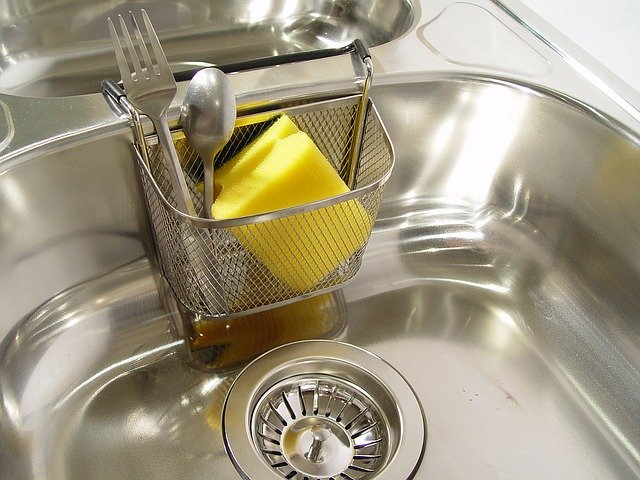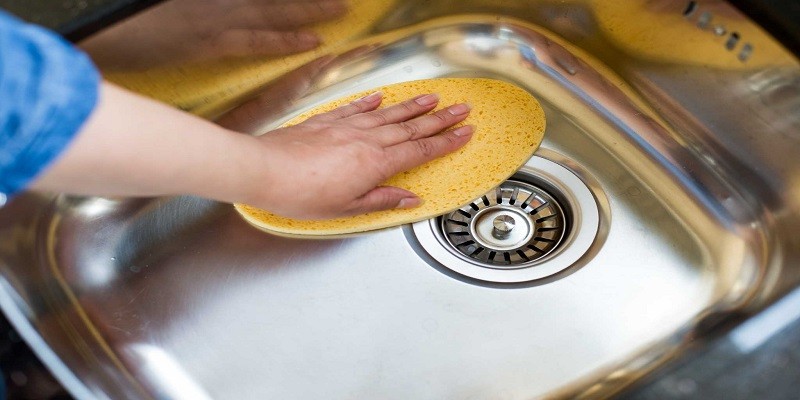Last Updated on October 18, 2023
To clean stainless steel sink hard water stains, create a mixture of vinegar and water and apply it to the stains using a cloth or sponge.

Credit: maidsandmoore.com
The Causes Of Hard Water Stains
It’s frustrating when hard water stains take away the shine from your beautiful stainless steel sink. But fret not! In this section, we will delve into the causes of hard water stains and understand how they impact your stainless steel sink.
So, let’s get started!
Explanation Of How Hard Water Stains Are Formed:
- Hard water contains higher mineral content, especially calcium and magnesium.
- When hard water comes into contact with your stainless steel sink, it leaves behind mineral deposits.
- These mineral deposits create unsightly stains over time, making your sink appear dull and dirty.
Now that we understand how hard water stains are formed, let’s explore the impact they have on stainless steel sinks.
Discussing The Impact Of Hard Water On Stainless Steel Sinks:
- Hard water stains can make your stainless steel sink look worn out and neglected.
- The minerals in hard water can cause discoloration and rust spots on your sink.
- These stains can be stubborn and resistant to regular cleaning methods.
- If left untreated, hard water stains can weaken the protective layer of stainless steel, leading to pitting and corrosion.
To ensure the longevity and beauty of your stainless steel sink, it’s crucial to address hard water stains promptly. In the next section, we will discuss effective methods to clean and remove hard water stains from your stainless steel sink.
Stay tuned!
Effective Cleaning Methods For Hard Water Stains
If you’re tired of those stubborn hard water stains on your stainless steel sink, fret not! There are several effective cleaning methods you can try to restore the sparkling shine to your sink. Here are three tried-and-tested approaches:
Using White Vinegar And Baking Soda
- Create a paste by mixing equal parts of white vinegar and baking soda.
- Apply the paste directly to the stained areas of your sink.
- Gently scrub the stains using a soft sponge or cloth.
- Rinse thoroughly with water and wipe dry with a clean cloth.
Applying Lemon Juice And Salt
- Cut a lemon in half and dip one half in salt.
- Scrub the hard water stains with the lemon half, using the salt as an abrasive agent.
- Allow the lemon juice and salt mixture to sit on the stains for a few minutes.
- Rinse the sink thoroughly with water and dry with a clean cloth.
Utilizing Commercial Stainless Steel Cleaners
- Opt for a commercial stainless steel cleaner specifically designed to tackle hard water stains.
- Follow the product instructions, as different cleaners may have varying application methods.
- Apply the cleaner to the stained areas of your sink.
- Use a soft sponge or cloth to gently scrub the stains.
- Rinse thoroughly with water and wipe dry with a clean cloth.
By using these effective methods, you can easily bid farewell to those pesky hard water stains on your stainless steel sink. Choose the method that suits you best and enjoy the gleaming results!
Prevention And Maintenance Tips For Long-Term Results
Stainless steel sinks are a popular choice for many homeowners due to their durability and sleek appearance. However, hard water stains can be a common issue, leaving your sink looking dull and unclean. To ensure long-term results and keep your stainless steel sink looking its best, implementing prevention and maintenance tips is key.
In this section, we will explore some effective strategies to combat hard water stains and maintain the luster of your stainless steel sink.
Regularly Wiping And Drying The Sink:
- After each use, make it a habit to wipe down the sink with a soft cloth or sponge. This simple step helps to prevent mineral buildup and water spots from forming on the surface.
- Remember to dry the sink thoroughly with a clean cloth to minimize the chances of water stains.
- Avoid using abrasive cleaners or scrub brushes as they can scratch the stainless steel surface. Opt for non-abrasive cleaning solutions specially formulated for stainless steel sinks.
Installing A Water Softener System:
- Consider installing a water softener system in your home to combat hard water issues. These systems remove minerals such as calcium and magnesium that contribute to the formation of hard water stains.
- By treating the water before it reaches your sink, a water softener system can significantly reduce the occurrence of hard water stains and prolong the lifespan of your stainless steel sink.
- Consult with a professional plumber to determine the best water softening solution for your specific needs.
Implementing Protective Coatings For The Sink Surface:
- Apply a protective coating or sealant to the surface of your stainless steel sink. These coatings create a barrier between the sink and water, helping to prevent hard water stains from forming.
- Before applying any coating, ensure that the sink surface is clean and free from any existing stains. Follow the manufacturer’s instructions for application and maintenance.
- Regularly check the condition of the protective coating and reapply as necessary to maintain its effectiveness.
Implementing these simple yet effective prevention and maintenance tips will help you keep your stainless steel sink free from hard water stains and looking its best for years to come. By regularly wiping and drying the sink, installing a water softener system, and implementing protective coatings, you can enjoy a sparkling clean stainless steel sink with long-lasting results.
Frequently Asked Questions For How To Clean Stainless Steel Sink Hard Water Stains?
How Do I Remove Hard Water Stains From A Stainless Steel Sink?
To remove hard water stains from a stainless steel sink, mix vinegar and water, scrub the sink with the solution, and rinse thoroughly.
What Is The Best Way To Clean A Stainless Steel Sink?
The best way to clean a stainless steel sink is to use a mild cleanser or dish soap, warm water, and a soft cloth or sponge.
Can I Use Lemon Juice To Remove Hard Water Stains From My Sink?
Yes, you can use lemon juice to remove hard water stains from your sink. Squeeze lemon juice on the stains, let it sit for a few minutes, and then scrub and rinse.
How Often Should I Clean My Stainless Steel Sink?
It is recommended to clean your stainless steel sink at least once a week to maintain its shine and prevent the build-up of dirt and stains.
Is It Safe To Use Baking Soda To Clean A Stainless Steel Sink?
Yes, baking soda is safe to use to clean a stainless steel sink. Make a paste of baking soda and water, apply it to the sink, scrub gently, and rinse thoroughly.
Conclusion
To effectively clean hard water stains from your stainless steel sink, remember to use non-abrasive methods and products. A mixture of vinegar and water, lemon juice, or baking soda can work wonders in tackling these stubborn stains. Gently scrub the affected areas using a soft cloth or sponge, making sure to rinse thoroughly afterwards.
Prevent future buildup by wiping the sink dry after each use, and using a protective wax or mineral oil to maintain its shine. Remember, regular maintenance is key to preserving the beauty of your stainless steel sink. With these simple steps, you can restore its sparkle and ensure it remains an attractive and hygienic centerpiece in your kitchen.
So, bid farewell to hard water stains and say hello to a pristine stainless steel sink that you can be proud of!




